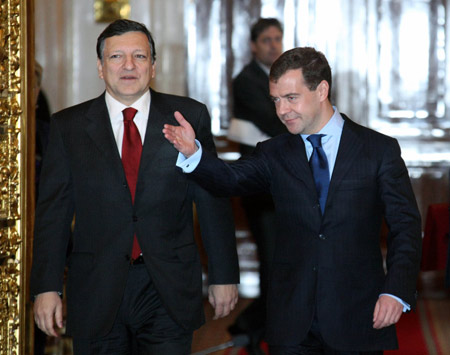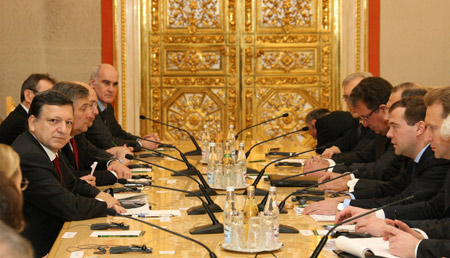Russian President Dmitry Medvedev on Friday met with European Commission President Jose Manuel Barroso on energy security, the global financial crisis and Russia-EU ties.
"The recent gas crisis has shown that things are far from perfect here. The situation is very vulnerable," Medvedev told a meeting with the leadership of the European Commission at the Kremlin.
 |
|
Russian President Dmitry Medvedev (R) greets European Commission President Jose Manuel Barroso prior to their meeting at the Kremlin in Moscow, Russia, Feb. 6, 2009. Barroso and nine commissioners traveled to Moscow on Friday for strategic talks with Russian President Dmitry Medvedev, Prime Minister Vladimir Putin and other government officials. The purpose of this high-level visit was to address important bilateral issues and to set out the strategic direction for EU-Russia relations in the coming years. [Shen Bohan/Xinhua] |
"We need to think about creating a full-fledged international legal system to protect against such incidents, because the current system doesn't work," Medvedev said.
The Russian president urged the European Union to consider "further steps in the area of ensuring security on the European continent," apparently referring to Russia's proposal of a new European security treaty.
Barroso backed Medvedev's view that European energy security should be ensured.
 |
|
Russian President Dmitry Medvedev (R2) meets with European Commission President Jose Manuel Barroso (L1) at the Kremlin in Moscow, Russia, Feb. 6, 2009. [Shen Bohan/Xinhua] |
"It is very important now to make efforts to prevent such problems in the future. We believe energy security is a very important sphere of interest for Russia and the European Union," Barroso said.
The European Commission chief also called for "positive interdependence" in relations, saying it is more important now than ever because of the serious global financial crisis.
The Russia-EU relations deteriorated recently due to the brief war between Russia and Georgia last August and Russia's gas row with Ukraine in January, which left millions of Europeans without heating in the depth of winter for two weeks.
(Xinhua News Agency February 7, 2009)